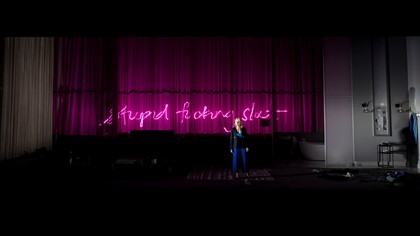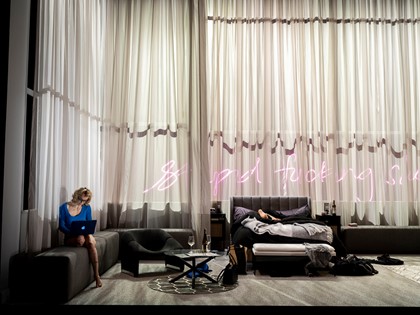Provocation: Wearing a Red 'A' By Van Badham
Playwright, critic and Guardian columnist Van Badham reflects on the thick skin women with opinions earn speaking in the public arena.
By Van Badham
Posted Aug 26, 2022
Content warning: ableist language and abuse
I awake to a love letter in the hidden message folder of my Instagram account. Big Ed—who has a private account, and 11 followers, wants me to know I’m on his mind.
You are a fucking r*tard, he wrote to me at 1:22am on Friday night. You are one evil c*nt.
I’m touched to have made such an impression, but I’m also confused. Usually, I receive correspondence like this when I’ve done something in public that’s considered provocative. You know—written an article that insists rape is bad, or one that draws attention to a profound difference in gendered outcomes around an issue like… take home pay. When I go on television, the issues discussed are less important; what’s provocative is just me being there. Every time I’ve been on Q & A, I’ve been told that I am irredeemably fat 1000 times in the hour.
But I haven’t been on television in a couple of months, and my last article was about the ideological overlap between Trump supporters and Australian anti-vaxxers. So Big Ed’s attentions are a delightful surprise.
Please don’t presume that I think I’m in any way special for the tender communications I receive. Harassment of women is endemic to the internet; studies report a whopping 81% of American women have been abused online.
Where there is overwhelming shared experience, there is ready peer support; mystified by the sudden attention of Big Ed, I inquired of my nearest group chat what they guessed I may have done.
They’ve lived every kind of social media hate campaign, these women; the cruel, abusive comments, the dogpiling by summoned hordes, the doxing of personal details published on anonymous message-boards, the insidious attacks on people's jobs. These last include poisonous letters to employers, vindictive petitions, invented mythologies spawned on the internet and spun off into mass media.
Sometimes, they’ve had to have police protection.
Nina Jankowicz, my friend, recently found herself dragged along this path all the way to the cover of The New York Post. She’s one of the world’s foremost experts on counter-disinformation policy, a scholar and author who advised the government of Ukraine on how to resist Russian propaganda. Appointed by the Biden Administration to coordinate cross-department counter-disinformation policy, she found herself the immediate target of a public shaming campaign.
As they dug up old TikTok videos of her singing show tunes to discredit her, sent an avalanche of death threats, made attack videos and recorded podcasts smearing her name and reputation, her face appeared on the front of that newspaper with the caption: Big Sister is Watching You. You can even buy t-shirts from online printing sites commemorating the attempts to bully her.
Nina quit the job. In other times, she may have stayed… but she was eight and a half months pregnant when it struck.
In Nathaniel Hawthorne’s 1850 novel The Scarlet Letter, heroine Hester Prynne is made to wear a red A on her garments to signify her stigma for having a child out of wedlock in her Puritan community. The point of the mark is not merely to identify Hester as a sinner, but to reflect to her vain shamers a reminder of their own supposed moral superiority.
Similarly, the attacks that me, Nina, any of our friends, any women on the internet endure are not about our perceived sins as individuals. Public shaming exists to reflect to our harassers their power of being able to wield harm, to smear and to frighten, and to brand women as sometimes sinners, sometimes victims, but always foolish, weak, and breakable.
But I’ve had ten years of this on the internet. Dear Big Ed, I’ve learned the only power you have is the power I choose you to have over me—because after a decade of firebombs like yours, the delicate skin I had that used to shrivel at a nasty word has all burnt off. You are just a temporal curiosity to me now—an event to mark something of significance and provocation I may have been doing at the time.
I don’t know what caused this specifically, Van, responded a friend in the group chat. I know what causes it generally. These jerks just can’t believe women speak or exist without their permission or approval.
I’m perplexed at my offence, I responded. The last thing I posted on Instagram was a photo of some quiche.
Back in the 80s there was a humour book called Real Men Don’t Eat Quiche, she said. Maybe he felt attacked.
Van Badham is a playwright, occasional broadcaster, critic and trade union feminist. She writes columns for the Guardian, and is the author of QAnon And On: A Short and Shocking History of Internet Conspiracy Cults.

